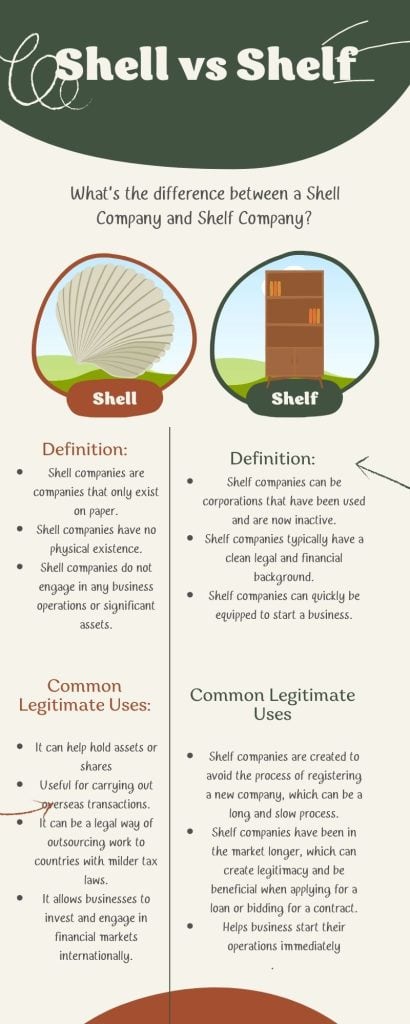Shelf companies and Shell companies can be confused with one another, but they differ in assets, purpose, legitimacy, and regulation.
If you’re new to the world of finance and business, there are plenty of terms you might have difficulty understanding.
A few of those terms can be Shelf companies and Shell companies. Fortunately, this blog is probably the best article that you’ll find to help you comprehend their distinction.
Below, we’ll tackle the two terms, highlighting their services and legal importance.
Without further ado, let’s dive in and discuss the differences between shelf and shell companies.

Shell Company
Firstly, let’s tackle what a Shell company is. Shell companies are companies that only exist on paper.
Typically, shell companies have no physical existence other than a mailing address and a kept bank account for transaction purposes.
These companies do not engage in any business operations or significant assets.
Large companies form shell companies to distribute activities such as holding shares or assets offshore.
Shell companies can be legitimate. For instance, legitimate uses of these companies include acting as a vehicle for business transactions, restructuring, or simplifying complex business functions.
However, there are still downsides to using shell companies. For example, there is a lack of transparency, and it has become a more common tool for financial crimes like money laundering.
Shell Company’s Common Legitimate Uses
- It can help hold assets or shares
- Useful for carrying out overseas transactions.
- It can be a legal way of outsourcing work to countries with milder tax laws.
- It allows businesses to invest and engage in financial markets internationally.
Shelf Company
Creating a shelf company is harder since you’d have to follow all rules and requirements. Shelf companies can be corporations that have been used and are now inactive, waiting for a new buyer.
Generally, these companies have a clean legal and financial background.
Once purchased, the buyer of the shelf company has a lot of administration work to complete. For instance, he/she will have to find a new management, transfer shares, and change the address and name.
Shelf Company’s Common Legitimate Uses
- Shelf companies are created to avoid the process of registering a new company, which can be a long and slow process.
- Shelf companies have been in the market longer, which can create legitimacy and be beneficial when applying for a loan or bidding for a contract.
- Helps business start their operations immediately.
Shell Company vs. Shelf Company Key Differences
Now that we’ve defined both Shell Company and Shelf Company, here are their key differences:
Purpose
Shell companies and shelf companies work in various ways and for different purposes. Shell companies are often created as a vehicle for other business transactions.
Transactions here can be legitimate but can also be unlawful since they have an anonymous nature.
Legitimacy
As discussed above, shell companies can sometimes be connected with illegal activities. On the other hand, Shelf companies are typically more favorable since their purpose is to simplify and speed up the start of business operations.
Regulation
Shell companies, especially ones that were created in offshore financial centers or tax havens, are more subjected to intense review or scrutiny from regulatory bodies since they are more prone to potential misuse for tax evasion and money laundering.
Shelf companies, on the other hand, went to standard business regulatory supervision unless found associated with illegal activities.
Activity
Shell companies and shelf companies also differ in their business activity and assets. Shell companies are often inactive or usually without assets.
Even though usually inactive, shelf companies can quickly be equipped with the essential assets to start a business.
When does it become illegal?
Shell companies and shelf companies can both be used for illegal activities.
Shelf companies can become illegal when they are used to deceive lenders and immorally get credit lines.
Shelf companies can make their buyer appear to have credible attributes like legitimacy and stability.
It’s also easy for shell companies to do illicit activities since the company’s jurisdiction has lenient tax laws.
Also, the creator of the shell company has the choice never to reveal themselves.
Frequently Asked Questions
What is the difference between a front company and a shell company?
A front company can be more than a shell company since it can be a real company with an active physical presence and conducts legal businesses at times.
Their main difference is that a front company is designed to hide the true originator or user of illicit activities or transactions.
How do you know if something is a shell company?
Check public records in the area where the shell company is located. It can help identify the exact address and the names and addresses of the owners.
A possible risk indicator of a shell company is the difficulty in receiving information about the transaction or transfer founders.
What is the purpose of a shell company?
Shell companies are often used to hold funds and manage other financial transactions.
They do not actively engage in money-making but store cash to engage in other illegal business activities like money laundering or fund storing.

Shelf Companies and Shell Companies Differences: Final Thoughts
Understanding the differences between shell companies and shelf companies is essential if you’re trying to get into business and finance.
By understanding these terms, you can navigate complex corporate structures easily.
These types of companies have their own purpose and function in the marketplace. They are tools used to benefit the corporation, employees, and customers.
Both shell and shelf companies can have legitimate uses. However, both can also be part of illegal activities.
Shell companies have no physical presence, documents, office, or employees. Their business operations are also inactive. These companies are prone to money laundering and other illicit activities since it is easy to form and operate.
On the other hand, shelf companies are registered companies that have been “put on a shelf” and left inactive for an extended period until someone purchases it.
Shell and shelf companies differ in business activities, intent, legitimacy, and regulation.
